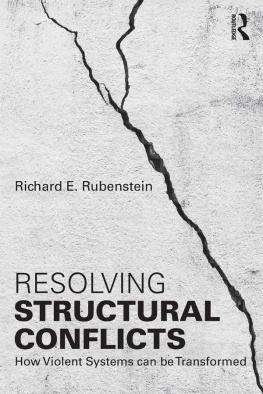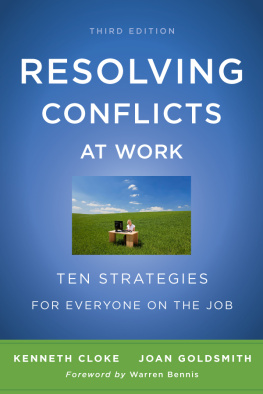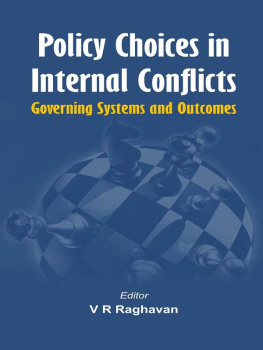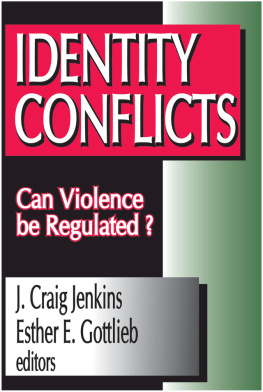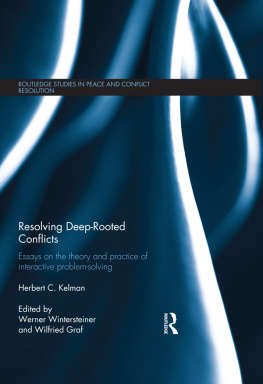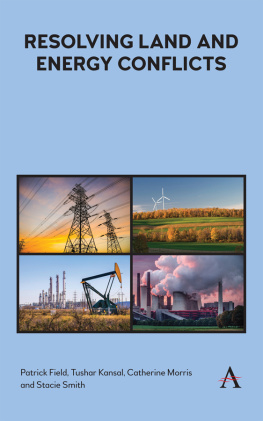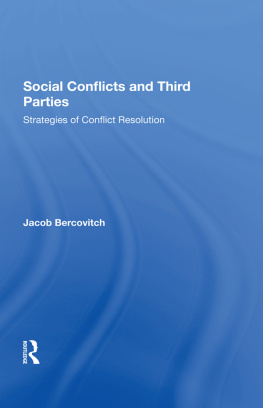p.i
RESOLVING STRUCTURAL CONFLICTS
This book analyses how certain types of social systems generate violent conflict and discusses how these systems can be transformed in order to create the conditions for positive peace.
Resolving Structural Conflicts addresses a key issue in the field of conflict studies: what to do about violent conflicts that are not the results of misunderstanding, prejudice, or malice, but the products of a social system that generates violent conflict as part of its normal operations. This question poses enormous challenges to those interested in conflict resolution, since the solution to this problem involves restructuring social, political, and cultural systems rather than just calling in a mediator to help people arrive at an agreement. This study breaks new ground in showing how local conflicts involving crime, police, and prisons; transnational conflicts involving religious terrorism by groups like ISIS; and international conflicts involving Great Power clashes are all produced in large part by elite-driven, exploitative or oppressive social structures. It also presents new ideas about the implications of this structural turn for the practice of conflict resolution, emphasizing the need for conflict resolvers to embrace a new politics and to broaden their methods far beyond traditional forms of facilitation.
Written by a leading scholar, this book will be of much interest to students of conflict resolution, peace studies, war and conflict studies, sociology, political science and international relations in general.
Richard E. Rubenstein is University Professor of Conflict Resolution and Public Affairs at the School for Conflict Analysis and Resolution, George Mason University, and the author of eight books, including most recently Reasons to Kill: Why Americans Choose War (2010).
p.ii
Routledge Studies in Peace and Conflict Resolution
Series Editors: Tom Woodhouse and Oliver Ramsbotham
University of Bradford
Peacebuilding and Friction
Global and local encounters in post-conflict societies
Edited by Annika Bjrkdahl, Kristine Hglund, Gearoid Millar, Jar van der Lijn and Willemijn Verkoren
Resolving Deep-Rooted Conflicts
Essays on the theory and practice of interactive problem-solving
Herbert C. Kelman
Edited by Werner Wintersteiner and Wilfried Graf
Climate Change and Resource Conflict
The role of scarcity
Judith M. Bretthauer
Ceasefire Agreements and Peace Processes
A comparative study
Malin kebo
Conflict Transformation and the Palestinians
The dynamics of peace and justice under occupation
Edited by Alpaslan zerdem, Chuck Thiessen and Mufid Qassoum
Peacebuilding and Post-War Transitions
Assessing the impact of external-domestic interactions
Lisa Gro
Resolving Structural Conflicts
How violent systems can be transformed
Richard E. Rubenstein
p.iii
RESOLVING STRUCTURAL
CONFLICTS
How Violent Systems Can Be
Transformed
Richard E. Rubenstein

p.iv
First published 2017
by Routledge
2 Park Square, Milton Park, Abingdon, Oxon OX14 4RN
and by Routledge
711 Third Avenue, New York, NY 10017
Routledge is an imprint of the Taylor & Francis Group, an informa business
2017 Richard E. Rubenstein
The right of Richard E. Rubenstein to be identified as author of this work has been asserted by him in accordance with sections 77 and 78 of the Copyright, Designs and Patents Act 1988.
All rights reserved. No part of this book may be reprinted or reproduced or utilised in any form or by any electronic, mechanical, or other means, now known or hereafter invented, including photocopying and recording, or in any information storage or retrieval system, without permission in writing from the publishers.
Trademark notice : Product or corporate names may be trademarks or registered trademarks, and are used only for identification and explanation without intent to infringe.
British Library Cataloguing-in-Publication Data
A catalogue record for this book is available from the British Library
Library of Congress Cataloging-in-Publication Data
Names: Rubenstein, Richard E.
Title: Resolving structural conflicts : how violent systems can be transformed / Richard E. Rubenstein.
Description: Abingdon, Oxon : New York, NY : Routledge, 2017. |Series: Routledge studies in peace and conflict resolution | Includes bibliographical references and index.
Identifiers: LCCN 2016035099| ISBN 9781138956322 (hardback) | ISBN 9781138956339 (pbk.) | ISBN 9781315665764 (ebook)
Subjects: LCSH: Conflict managementSocial aspects. | Social conflict. | Culture conflict. | Social change.
Classification: LCC HM1126 .R83 2017 | DDC 303.6/9dc23
LC record available at https://lccn.loc.gov/2016035099
ISBN: 978-1-138-95632-2 (hbk)
ISBN: 978-1-138-95633-9 (pbk)
ISBN: 978-1-315-66576-4 (ebk)
Typeset in Bembo
by Swales & Willis Ltd, Exeter, Devon, UK
p.v
For My Students
p.vi
Rubenstein actually does two jobs in Resolving Structural Conflicts . He not only shows how vertical, exploitative class structures, pitting high against low domestically and protecting class all over through global hegemony can be broken down. He also paves the way intellectually for breaking the taboos on class in US thinking about conflict without falling into the many Marxist traps. I strongly endorse the book as a major contribution to US conflict studies.
Johan Galtung, Founder of Transcend International
Richard Rubenstein has done it again! In an accessible, wide-ranging, and brilliant set of discussions he places a mirror before all of us engaged in peace and conflict studies and practice. We have for too long relied on simple explanations about change strategies when we face direct and structural violence , a field-wide habit that attends to the first but rarely the second. Rubensteins comprehensive and constructive engagement suggests our platitudes and frameworks must evolve in ways that more seriously address the challenge of how we pursue systemic and structural change. Filled with practical examples, theoretically sophisticated interaction with key authors in both conflict resolution and the wider social sciences, and ground-breaking critique and ideas, this book deepens and expands our scholarship and practice alike. A must-read for which we should all be grateful!
John Paul Lederach, Kroc Institute, University of Notre Dame, USA
In this provocative book Richard Rubenstein sets out to answer two basic questions: How does the socioeconomic system generate violence? And what can conflict specialists do about it? In response, he returns us to two of the formative ideas in peace and conflict studies unfulfilled human needs and structural violence and elaborates them through theorizing and practice in the first two waves of conflict and conflict resolution, focused on interests and identity. Rubenstein argues for a third wave, which demands a critical engagement with the socioeconomic system, the structure , within which all the other dynamical, symbolic, and political systems are embedded. This entails breaking the silence about social class, and about class struggle as the conflict that dare not speak its name. In returning conflict resolution to structure and class, he argues for recognizing that poverty, inequality, and indelible harm to human dignity, generate and reproduce conflict and violence as normal or naturalized, thus invisible or taken-for-granted. He rejects a vision of conflict resolution as pallid reform, or an acquiescent abstentionism that believes profound structural change is unlikely or impossible. Deeply analytical, infused with passion and powerfully written, I read this book as a provocation, a challenge to conflict studies and conflict resolution practice.
Next page
